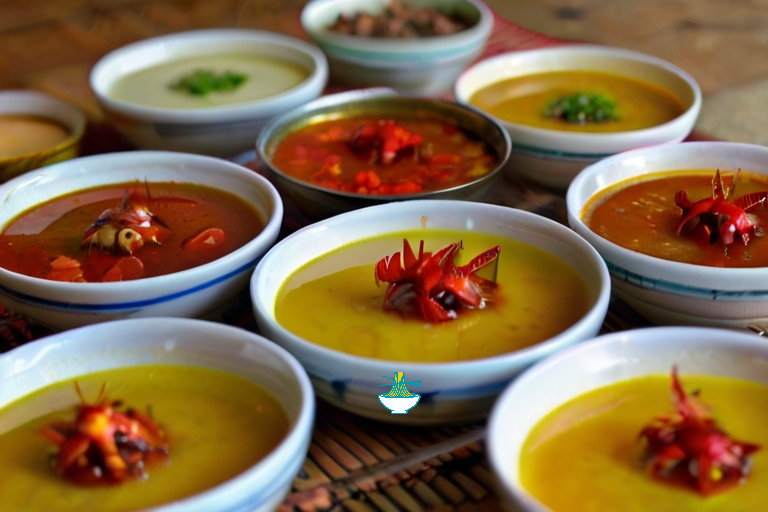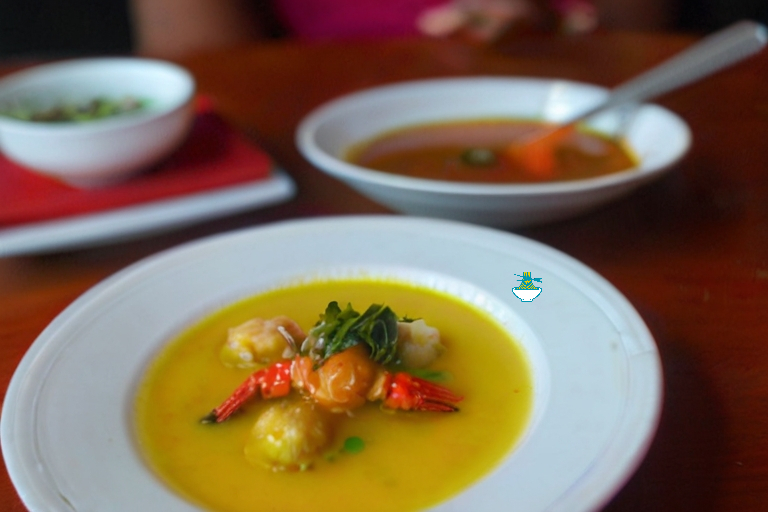Welcome to the vibrant world of Cameroonian cuisine, where flavors dance on your palate and each dish tells a story of tradition and culture. Among the rich tapestry of culinary delights that Cameroon offers, Achu stands out as a beloved delicacy cherished by many across the nation.
Originating from the western regions of Cameroon, Achu is a hearty dish that encapsulates the essence of Cameroonian gastronomy. It's a dish that not only tantalizes the taste buds but also serves as a cultural emblem, passed down through generations.
In this recipe, we'll embark on a culinary journey to recreate the authentic flavors of Achu, highlighting its unique blend of ingredients and cooking techniques. So, gather your ingredients, prepare your pots, and let's delve into the art of making this beloved Cameroonian dish.
Ingredients:
- 1 kg of cocoyam or yam (peeled and chopped)
- 500g of assorted meats (beef, chicken, or fish), chopped into bite-sized pieces
- 2 cups of dried fish, cleaned and soaked
- 1 cup of crayfish, ground
- 2 cups of palm nut pulp or peanut butter
- 2 onions, finely chopped
- 3 tomatoes, chopped
- 3 cups of water
- Salt to taste
- Red palm oil for frying
- Maggi cubes (optional, for seasoning)

Instructions:
Prepare the Cocoyam or Yam:
1- Peel and chop the cocoyam or yam into small pieces.
2- Rinse them thoroughly in cold water to remove any dirt.
Cook the Cocoyam or Yam:
1- Place the chopped cocoyam or yam in a large pot and cover with water.
2- Boil until the cocoyam or yam is soft and tender, usually about 20-30 minutes.
3- Drain the cooked cocoyam or yam and set aside.
Prepare the Palm Nut or Peanut Soup:
1- In a separate pot, heat some red palm oil over medium heat.
2- Add the chopped onions and sauté until they are soft and translucent.
3- Stir in the chopped tomatoes and cook until they are softened.
4- Add the assorted meats and dried fish to the pot, stirring to combine.
5- Pour in the palm nut pulp or peanut butter and stir well to combine.
6- Add water gradually to achieve your desired consistency for the soup.
7- Season with salt and Maggi cubes if desired, then simmer gently for about 20-30 minutes, allowing the flavors to meld together.
Prepare the Achu:
1- Take a portion of the cooked cocoyam or yam and pound it in a mortar and pestle until smooth. Alternatively, you can use a food processor to achieve a smooth consistency.
2- Mold the pounded cocoyam or yam into small balls or cylindrical shapes.
Serve:
1- Arrange the molded cocoyam or yam on a serving platter.
2- Ladle the palm nut or peanut soup over the Achu.
3- Garnish with chopped parsley or green onions if desired.
4- Serve hot and enjoy the authentic flavors of Cameroon Achu with family and friends!
This traditional Cameroonian dish is a celebration of flavors and textures, bringing together the earthy taste of cocoyam or yam with the rich and savory palm nut or peanut soup. Enjoy the culinary journey through Central Africa with every bite of this delightful delicacy!
Nutritional Values:
Here's an approximate nutritional breakdown for the ingredients used in the Cameroon Achu recipe:
Cocoyam or Yam (1 kg):
- Calories: Approximately 1,100 kcal
- Carbohydrates: Approximately 250 grams
- Fiber: Approximately 30 grams
- Protein: Approximately 10 grams
- Fat: Approximately 1 gram
benefits: Rich in carbohydrates for energy, fiber for digestion, and vitamins and minerals such as vitamin C, potassium, and manganese for overall health.
Assorted Meats (500g):
- Nutritional values vary depending on the type of meat used (beef, chicken, or fish).
- Typically, 500g of assorted meats might contain:
- Calories: Approximately 1,000-1,200 kcal
- Protein: Approximately 80-100 grams
- Fat: Approximately 60-80 grams
benefits: Excellent sources of high-quality protein for muscle growth and repair, as well as essential vitamins and minerals like iron, zinc, and B vitamins for overall health and vitality.
Dried Fish (2 cups, soaked):
- Calories: Approximately 200-300 kcal
- Protein: Approximately 40-60 grams
- Fat: Approximately 10-20 grams
benefits: Provides lean protein, omega-3 fatty acids for heart health, and essential minerals like calcium and phosphorus for bone strength.
Crayfish (1 cup, ground):
- Calories: Approximately 100 kcal
- Protein: Approximately 20 grams
- Fat: Approximately 2 grams
benefits: High in protein, low in fat, and a good source of essential minerals like iron, magnesium, and selenium.
Palm Nut Pulp or Peanut Butter (2 cups):
- Calories: Approximately 1,600-2,000 kcal
- Carbohydrates: Approximately 40-60 grams
- Protein: Approximately 40-60 grams
- Fat: Approximately 140-180 grams
benefits: Rich in healthy fats, protein, and fiber, providing sustained energy and promoting satiety. Also contains vitamins and minerals such as vitamin E, niacin, and magnesium.
Onions (2 onions):
- Calories: Approximately 100-150 kcal
- Carbohydrates: Approximately 20-30 grams
- Fiber: Approximately 4-6 grams
- Protein: Approximately 2-3 grams
- Fat: Approximately 1 gram
benefits: Packed with antioxidants, vitamins (particularly vitamin C), and minerals such as potassium and folate. They also contain compounds that may have anti-inflammatory and antimicrobial properties.
Tomatoes (3 tomatoes):
- Calories: Approximately 50-75 kcal
- Carbohydrates: Approximately 10-15 grams
- Fiber: Approximately 3-5 grams
- Protein: Approximately 2-3 grams
- Fat: Approximately 1 gram
benefits: High in vitamin C, potassium, and antioxidants like lycopene, which may help reduce the risk of chronic diseases such as heart disease and cancer.
Water (3 cups):
- No significant nutritional value.
benefits: Essential for hydration, digestion, and overall bodily functions. It helps regulate body temperature, flush out toxins, and transport nutrients to cells.
Salt:
- Contains sodium, intake should be moderate and adjusted according to individual dietary needs.
benefits: Provides sodium, an electrolyte essential for fluid balance, nerve function, and muscle contraction. However, excessive intake should be avoided due to potential health risks.
Red Palm Oil:
- Calories: Approximately 120 kcal per tablespoon
- Fat: Approximately 14 grams per tablespoon
benefits: Contains healthy monounsaturated and saturated fats, as well as vitamin E and beta-carotene, which have antioxidant properties and may promote heart health.
Maggi Cubes (optional):
- Nutritional values vary based on the brand and type. Typically, they contain salt, MSG, and other flavorings.
benefits: Often used as a seasoning agent, providing flavor to dishes. However, they may contain high amounts of sodium and should be used in moderation.
These nutritional values are approximate and can vary based on factors such as the specific ingredients used, cooking methods, and serving sizes. It's essential to consider individual dietary requirements and preferences when preparing and consuming this dish.


Comments